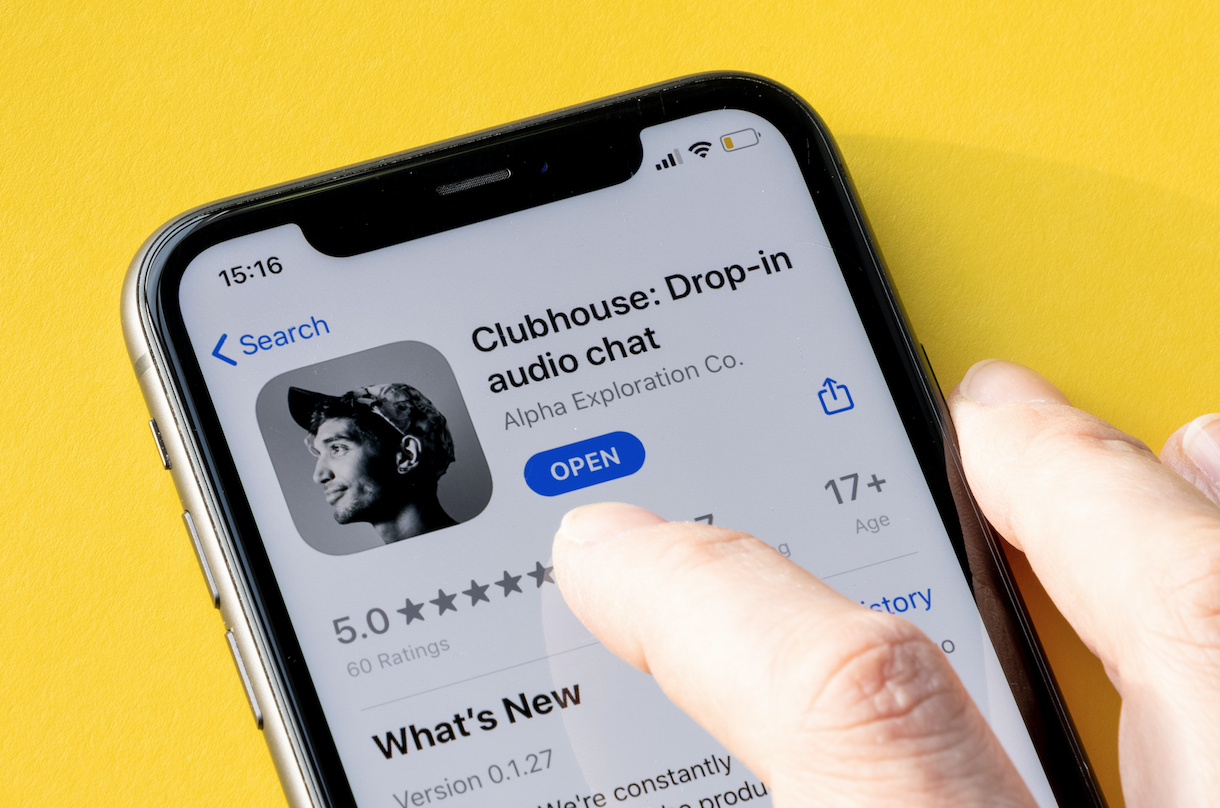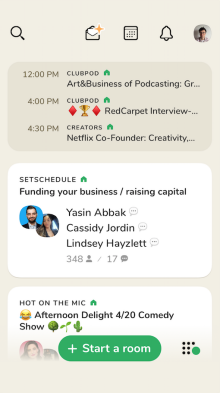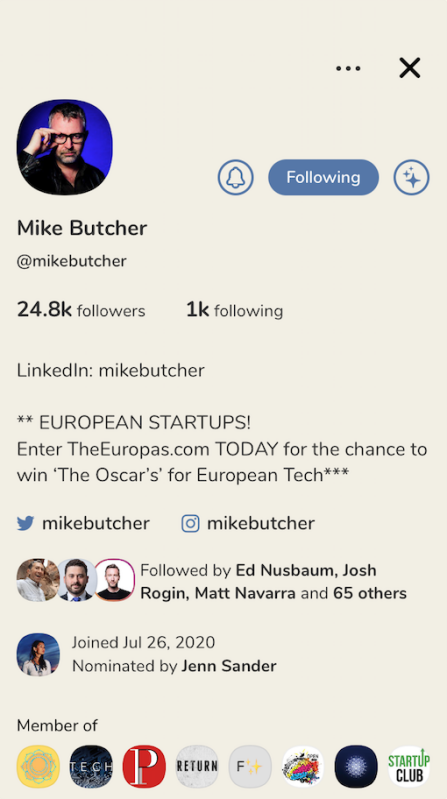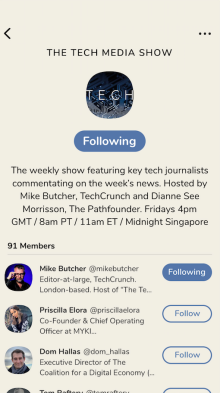
The Clubhouse craze of early 2021 is over. And now, as the dust settles, publishers need work out whether the social audio app is worth their time and effort.
Currently, few news brands are active on Clubhouse, and the app is facing stiff competition from established social media giants Facebook and Twitter, which are planning their own audio rivals.
Here, in the latest installment of Press Gazette’s Platform Profile series, we take a closer look at the app, find out which news outlets are using it, and weigh up the pros and cons of Clubhouse for publishers.
What is Clubhouse?
 Available as an iOS app since March 2020, Clubhouse describes itself as a “drop-in audio chat” platform.
Available as an iOS app since March 2020, Clubhouse describes itself as a “drop-in audio chat” platform.
What does this mean?
On opening the app, users – who have their own profiles, followers and followings, as on Twitter – can scroll through their homepage (pictured left) and opt to join different audio-based chats.
At the top of the home screen are upcoming meetings, or ‘rooms’, hosted by clubs that users follow.
On entering a room, users can listen in on the discussion and virtually raise their hand to ask to contribute to the discussion. Club hosts, often journalists, chair and moderate the discussions.
A Google Trends search suggests that, although Clubhouse went live in March 2020, interest in the app peaked in early February this year before dipping in recent months.
Clubhouse faces stiff competition from more established social media companies. Twitter announced a rival to Clubhouse called Spaces late last year, while Facebook this week unveiled a new suite of audio products.
Despite these challenges, Silicon Valley investors clearly have faith in Clubhouse. The company this week completed a funding round that reportedly valued it at $4bn.
How are publishers using Clubhouse?
Mike Butcher, the UK-based editor-at-large of TechCrunch, joined Clubhouse in the spring of 2020 and has amassed nearly 25,000 followers.
This year, he started co-hosting a weekly Clubhouse room through his club, the Tech Media Show.
How does it work? Butcher tells Press Gazette: “The main idea was to use the format of a group call to kick the tyres on the platform of Clubhouse.
“I didn’t have any fully formed ideas on creating a show as such. But I felt like if I dialled up some mates in the tech-media sector we could have a bit of a giggle with it… I didn’t make this as a big, commercially viable show.”
He describes the Tech Media Show as a “bit of a knock-about chat – and Clubhouse is quite good for that sort of thing. You don’t need sophisticated audio recording. You don’t need a big, huge, complicated set-up.”
Clubhouse isn’t perfect, though. Butcher notes that the size of his potential audience is diminished because the app is not available to Android users.
So why stick with Clubhouse?
Butcher says the Tech Media Show has tried to broadcast through Twitter Spaces. Currently, though, “Twitter Spaces is technologically behind Clubhouse in its implementation.
“The moderator tools are really not there are the moment. And you can’t do something like pre-schedule a show, which is really useful on Clubhouse at the moment – you can basically put up a link and say: ‘On Friday afternoon, go to this link.'”


However, he adds, when Twitter Spaces are improved, Clubhouse could face stiff competition because Twitter is a more established social media with a larger audience.
But, noting its recent $4bn valuation, Butcher says: “I think Clubhouse is doing well… it’s not going anywhere.”
He also predicts that audio features it has “pioneered” are “probably going to end up in lots of things in the same way that Snapchat came up with Stories and the Stories feature was copied by Instagram, Facebook and other platforms. But it is a bit horses for courses.
“So I think our show will eventually work very well on something like Twitter Spaces because it is designed to be very public, for public consumption.
“And at the moment Clubhouse isn’t really in that public sphere because it’s on one platform and it’s invite-only.”
In the United States, Butcher’s former TechCrunch colleague Josh Constine – who is now a tech investor – has established one of Clubhouse’s larger groups, Pressclub.
Constine has hosted several high-profile guests from the tech world, including Facebook boss Mark Zuckerberg. He also enhances the value of his meetings by recording them and turning them into podcasts.
‘If I do host a room at some point, I’m going to treat it with the reverence of producing a podcast’
Butcher and Constine aside, few journalists have fully embraced Clubhouse at this stage. Many journalists have accounts, but most appear largely inactive.
Sophia Smith Galer, a BBC correspondent who is well known for her popularity on TikTok, has built up a following of 730 on Clubhouse.
Asked how she is using the app, Smith Galer tells Press Gazette: “I’ve just listened to people chat – I might raise my hand and be invited on as a speaker, but I am more often a lurker.
“When you do speak, if you’re speaking somewhere with a high listenership, you do see your follower count skyrocket if you’ve got an interesting bio. That’s why I’ve got over 700 even though I’ve barely said anything.
“I’ve already been able to use a few of the rooms I’ve been in for research for stories. There is an enormous amount of religious and spiritual content on there and I may well do a story in the future about it.”
In the future, Smith Galer says that she will consider hosting rooms on Clubhouse, noting that she would “treat it with the reverence of producing a podcast – structure, good speakers and a welcoming vibe.
“I’d rather not just do a random one with little value, which is why I haven’t done one yet. Some rooms are not always structured and I leave the ones that go on for too long. Tight, organised and full of character is how I like them.”
But, like Butcher of TechCrunch, she is not convinced Clubhouse will remain the best option. She says: “If Twitter Spaces captures the same addictiveness then I will definitely go on there – I have way more followers there.”
The Financial Times has formed a club on Clubhouse.
FT journalists spoken to by Press Gazette said they are currently “trialling” the app by hosting a handful of rooms per week.
The next discussion – titled ‘Can bitcoin ever be green?’ and hosted by Gillian Tett – will take place on Friday.
Why are most publishers not active on Clubhouse yet?
Despite the buzz surrounding Clubhouse earlier this year, many publishers – large and small – have not invested time and resources into building a presence on the platform.
Why?
Press Gazette asked David Chavern, chief executive of America’s News Media Alliance organisation, whether many of his members were active on Clubhouse.
He says: “I have asked several of my major members and, while they are all thinking about it and keeping an eye on it, no one sees the great use case yet.
“Since direct monetization through Clubhouse is, and likely will remain, limited, it has to be seen as a marketing opportunity to highlight your journalists and journalism. The ultimate goal, though, would still be to encourage people to head back to your own properties and subscribe.
“It is probably best compared to a podcast or getting a journalist on a TV panel. Both of those things are fine but, with a few exceptions, the direct monetization is weak or nonexistent. Also, the audience is still very small, even if it might be influential. You aren’t going to sell many subscriptions with Clubhouse, at least not yet.”
As a user, Chavern adds: “I don’t love the product yet. You can stumble upon some really good discussions, but the quality is wildly uneven. I don’t like to spend so much time hunting and pecking.”
Clubhouse for publishers: The verdict
After much buzz earlier in the year, the dust is settling around Clubhouse.
From a user perspective, there is a lot to like about an app that allows you to share a virtual room with high-profile public figures like Mark Zuckerberg.
Investors in Clubhouse, who have backed the app at a reported valuation of $4bn, clearly think it has huge potential.
So should publishers be doing more on the platform?
The reward is the opportunity to steal a march on rival publishers by building up a strong following on an up-and-coming social media.
The risk is that any effort to do so could be in vain – established social media companies like Twitter and Facebook could well develop equally good audio offerings and steal Clubhouse’s audience.
The reality is that, as things stand, Clubhouse is not a must-be-on platform for publishers, who need to prioritise other social media. But forward-thinking publishers are right to be keeping an eye on Clubhouse. If the app lives up to its hype, it could soon become a more worthwhile investment of time for publishers who can make it work.
Top photo credit: Boumen Japet/ Shutterstock
Email pged@pressgazette.co.uk to point out mistakes, provide story tips or send in a letter for publication on our "Letters Page" blog
